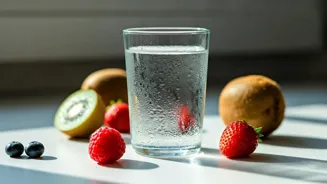Why Hydration Matters
Water is fundamental to life, constituting a significant portion of the human body. It facilitates numerous physiological processes, including nutrient
transport, waste removal, and temperature regulation. Dehydration, even mild, can negatively impact both physical and mental functions. This can lead to fatigue, headaches, and decreased cognitive performance. Adequate hydration also supports healthy skin, joint lubrication, and the efficient functioning of the digestive system. By maintaining proper hydration levels, individuals can enhance their overall health, energy levels, and overall quality of life. Drinking enough water is not merely about quenching thirst but is a fundamental aspect of supporting the intricate systems that govern human well-being. The body's internal mechanisms depend on it to function optimally.
Calculating Your Needs
Several online tools, such as hydration calculators, are available to estimate your daily water requirements. These tools typically consider factors like body weight, activity level, and environmental conditions. A common starting point is the '8x8 rule', which suggests consuming eight 8-ounce glasses of water daily. However, this is a general guideline. Hydration calculators provide a more personalized approach. They are designed to consider individual differences and provide a tailored hydration plan. The information entered in the calculator, such as weight, allows the tool to give a customized recommendation, unlike generic advice. By using these calculators, individuals can better align their fluid intake with their specific needs.
Using the Calculators
To utilize a hydration calculator, users typically input their body weight and activity levels. Some calculators also consider factors like the climate in which one lives and the types of food they eat. The calculator then generates a personalized recommendation for daily water intake. This information is a starting point, and it is essential to pay attention to your body's signals. Thirst is a primary indicator that your body needs water. Other signs of dehydration include dark urine, fatigue, and headaches. It's always advisable to consult a healthcare professional for more specific advice, especially for those with health conditions or special needs. Regular monitoring of hydration levels and adjusting water intake based on individual needs and physical activity is essential for optimal hydration.
Beyond Water Alone
While water is the primary source of hydration, other fluids and foods can also contribute to your daily fluid intake. Beverages like herbal teas, infused water, and diluted fruit juices can aid in hydration. Certain fruits and vegetables, such as watermelon, cucumbers, and spinach, have high water content, contributing to overall hydration levels. However, be mindful of the sugar content in some beverages. It's important to balance intake with a diet high in fruits and vegetables. It is recommended to combine this with the consumption of plain water. For those who are physically active or live in hot climates, increasing fluid intake to account for water loss through sweat is crucial. A diverse approach to hydration, encompassing various sources, ensures optimal well-being and functionality.
Listen to Your Body
The best guide to your hydration needs is your body itself. Pay attention to thirst signals, which are a clear indication that you need to drink. Monitor urine color as a simple way to gauge hydration levels; pale yellow urine generally indicates adequate hydration, while dark urine suggests you need more fluids. Beyond thirst and urine color, factors like physical activity, climate, and overall health status affect fluid requirements. If you are involved in intense physical activity or live in a hot environment, increase your water intake. For specific health concerns or medical conditions, consider consulting a healthcare provider to create an individualized hydration plan. Consistent observation of your body's signals will help you maintain optimal hydration and promote overall health.













